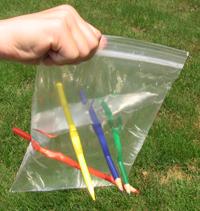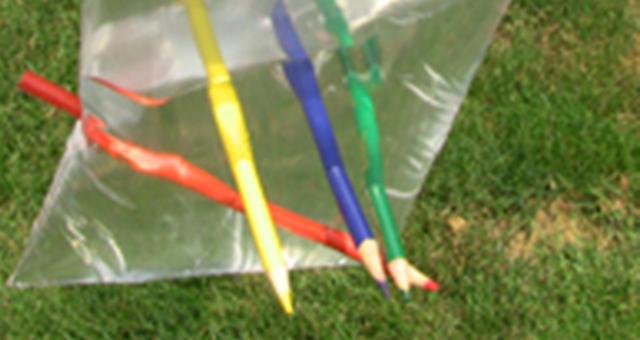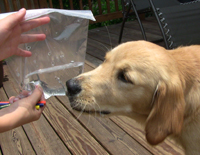A polymer is a chemical compound. Polymers are made up of long chains of molecules that are flexible. Plastic is a type of polymer. Plastics are bendy and stretchy because of their flexible molecule chains. In this experiment we will observe how polymers behave by observing what happens when we poke holes in a ziploc bag full of water. A ziploc bag is a plastic and a polymer.
What You Need
- Ziploc Bag
- Water
- Several Sharpened Pencils
Instructions to Poke Holes in a Ziploc

Fill the ziploc bag half full of water. Zip it closed. Hold a pencil in one hand while you use the other hand to poke the pencil all the way through the ziploc bag – have the pencil go in one side and come all the way out the other side. Repeat with more pencils. Does any water spill out? Do you know why? No water spills out of the holes because ziploc bags are made of a polymer.
When you poke the sharp pencil into the plastic the pencil point slides in between the chain of molecules that make up the polymer. The molecule chains “hug” the pencil, making a seal around the pencil that won’t let the water out. What happens when you pull the pencils out?
Once you figure out how to do this one, try to get someone to stand still while you are holding the bag over their head. Poke the pencils through the bag to get them to trust your science…then pull the pencils out and see what happens! We tried it over the dog’s head. She liked it when the pencils got pulled out – a dog drinking fountain!
Websites, Activities & Printables
- Kitchen Science Balloon Kebab
- Crash Course Chemistry #45: Polymers
- PBS Full STEAM Ahead Video – Ziploc Bag Polymer

You can also ask a math and science expert for homework help by calling the Ask Rose Homework Hotline. They provide FREE math and science homework help to Indiana students in grades 6-12.
e-Books and Audiobooks
Use your Library Card to check out books about Science Experiments at any of our locations, or check out science experiment e-books and audiobooks from OverDrive Kids right to your device! If you have never borrowed from Libby before, Libby directions and a Libby video tutorial are available, as well as OverDrive Support.
Need more help? Ask a Library staff member at any of our locations or call, text or email Ask-a-Librarian. Additionally, the Tinker Station helpline at (317) 275-4500 is also available. It is staffed by device experts who can answer questions about how to read, watch and listen on a PC, tablet or phone.
Satisfying DIY Recipe Books to Experience and Explain Polymers & the Science of Slime
Between them, these ten books provide 100+ different ways to explore slime, science that is stretchy, squishie and satisfying to mix up and ooze through your fingers! You experiment, these books will help you explain why slime behaves the way it does. Slime is fun. It’s also the science of polymers and chemistry.

